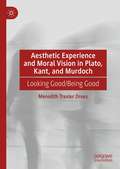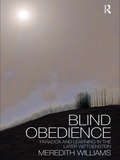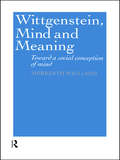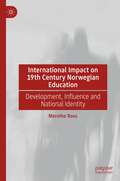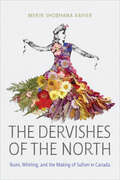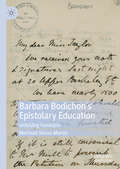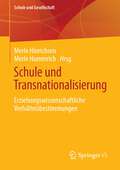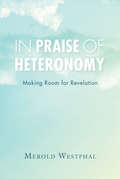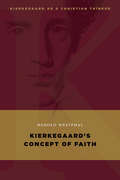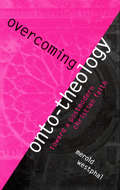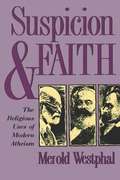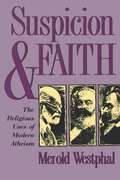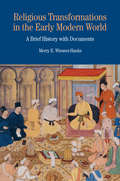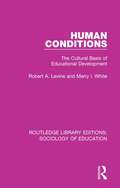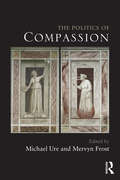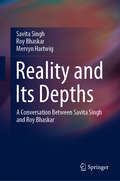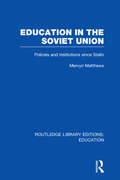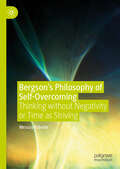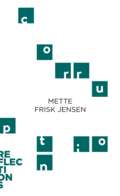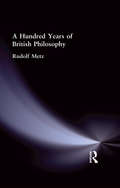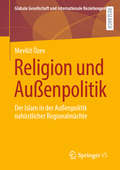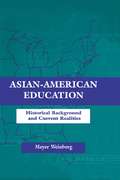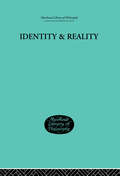- Table View
- List View
Aesthetic Experience and Moral Vision in Plato, Kant, and Murdoch: Looking Good/Being Good
by Meredith Trexler DreesThis book addresses how Plato, Kant, and Iris Murdoch (each in different ways) view the connection aesthetic experience has to morality. While offering an examination of Iris Murdoch’s philosophy, it analyses deeply the suggestive links (as well as essential distinctions) between Plato’s and Kant’s philosophies. Meredith Trexler Drees considers not only Iris Murdoch’s concept of unselfing, but also its relationship with Kant’s view of Achtung and Plato’s view of Eros. In addition, Trexler Drees suggests an extended, and partially amended, version of Murdoch’s view, arguing that it is more compatible with a religious way of life than Murdoch herself realized. This leads to an expansion of the overall argument to include Kant’s affirmation of religion as an area of life that can be improved through Plato’s and Murdoch’s vision of how being good and being beautiful can be part of the same life-task.
Blind Obedience: The Structure and Content of Wittgenstein's Later Philosophy
by Meredith WilliamsThere is considerable debate amongst philosophers as to the basic philosophical problem Wittgenstein is attempting to solve in Philosophical Investigations. In this bold and original work, Meredith Williams argues that it is the problem of "normative similarity". In Blind Obedience Williams demonstrates how Wittgenstein criticizes traditional, representationalist theories of language by employing the ‘master/novice’ distinction of the learner, arguing that this distinction is often overlooked but fundamental to understanding philosophical problems about mind and language. The book not only provides revealing discussions of Wittgenstein’s corpus but also intricate analyses of the work of Brandom, Dummett, Frege, Sellars, Davidson, Cavell and others. These are usefully compared in a bid to better situate Wittgenstein’s non-intellectualist, non-theoretical approach and to highlight is unique features.
Wittgenstein, Mind and Meaning: Towards a Social Conception of Mind
by Meredith WilliamsWittgenstein, Mind and Meaning offers a provocative re-reading of Wittgenstein's later writings on language and mind, and explores the tensions between Wittgenstein's ideas and contemporary cognitivist conceptions of the mental. This book addresses both Wittgenstein's later works as well as contemporary issues in philosophy of mind. It provides fresh insight into the later Wittgenstein and raises vital questions about the foundations of cognitivism and its wider implications for psychology and cognitive science.
International Impact on 19th Century Norwegian Education: Development, Influence and National Identity
by Merethe RoosThis book examines Norwegian education throughout the course of the 19th century, and discusses its development in light of broader transnational impulses. The nineteenth century is regarded as a period of increasing national consciousness in Norway, pointing forward to the political independency that the country was granted in 1905. Education played an important role in this process of nationalisation: the author posits that transnational – for the most part Scandinavian – impulses were more decisive for the development of Norwegian education than has been acknowledged in previous research. Drawing on the work of educator and school bureaucrat Hartvig Nissen, who is recognised as the most important educational strategist in 19th century Norway, this book will be of interest to scholars of the history of education and Norwegian education more generally.
The Dervishes of the North: Rumi, Whirling, and the Making of Sufism in Canada
by Merin Shobhana XavierThe thirteenth-century Muslim mystic and poet Jalal al-Din Rumi (1207–1273) is a popular spiritual icon. His legacy is sustained within the mystical and religious practice of Sufism, particularly through renditions of his poetry, music, and the meditation practice of whirling. In Canada, practices associated with Rumi have become ubiquitous in public spaces, such as museums, art galleries, and theatre halls, just as they continue to inform sacred ritual among Sufi communities. The Dervishes of the North explores what practices associated with Rumi in public and private spaces tell us about Sufism and spirituality, including sacred, cultural, and artistic expressions in the Canadian context. Using Rumi and contemporary expressions of poetry and whirling associated with him, the book captures the lived reality of Sufism through an ethnographic study of communities in Toronto, Montreal, and Vancouver. Drawing from conversations with Sufi leaders, whirling dervishes, and poets, Merin Shobhana Xavier explores how Sufism is constructed in Canada, particularly at the nexus of Islamic mysticism, Muslim diaspora, spiritual commodity, popular culture, and universal spirituality. Inviting readers with an interest in religion and spirituality, The Dervishes of the North illuminates how non-European Christian traditions, like Islam and Sufism, have informed the religious and spiritual terrain of Canada.
Barbara Bodichon’s Epistolary Education: Unfolding Feminism
by Meritxell Simon-Martin"This book brings together feminist histories in education with an innovative approach to epistolary narrative analytics. In deploying the notion of the epistolary bildung the author rigorously and eloquently shows how the correspondence of Barbara Bodichon can shed fresh light in a range of personal problems and public issues in women’s lives, which remain relevant today"- Maria Tamboukou, Professor of Feminist Studies, University of East London, UKThis book assesses Barbara Bodichon’s significance in the history of the women’s movement in Britain by elaborating a conceptualisation of letters as sources of feminist development. Bodichon was the leader of the first women’s suffrage committee in England, which collected 1,500 signatures in favour of the female vote – a petition presented in the House of Commons by sympathising MPs to support the amendment of the 1867 Reform Bill. This book explores the significance of letter-exchange in Barbara Bodichon’s feminist becoming as she managed to mobilize partisans and secure signatures by means of chains of friendship letters spreading across the country. For letters functioned as platforms where, concomitantly to her making sense of her experiential input, Bodichon adopted, redefined and challenged circulating discourses – transforming them in the process and hence contributing to the production of feminist knowledge, intersubjectively and collaboratively in dialogue with her addressees. At the crossroads of history of feminism, gender history and history of women’s education, this book explores the significance of letter-exchange in Bodichon’s development into one of the galvanizing figures of the women’s rights movement in Victorian England.
Schule und Transnationalisierung: Erziehungswissenschaftliche Verhältnisbestimmungen (Schule und Gesellschaft #66)
by Merle Hummrich Merle HinrichsenDas Buch bestimmt die Verhältnisse von Schule und Transnationalisierung angesichts globaler Migrations- und Fluchtbewegungen sowie vor dem Hintergrund zunehmender Internationalisierungs- und Digitalisierungsprozesse. Grenzüberschreitende Beziehungen und Verflechtungen von Schule und schulischen Akteuren sind in der Folge Bestandteil des schulischen Alltags. Mit Blick auf die Verknüpfung mit Bildung lassen sich zwei ungleichheitsrelevante Diskurse unterscheiden: Mobilität und Migration. Während Mobilität im Kontext Schule als erstrebenswerte Norm gilt, wird Migration vielfach als problematisch betrachtet.
In Praise of Heteronomy: Making Room for Revelation
by Merold WestphalRecognizing the essential heteronomy of postmodern philosophy of religion, Merold Westphal argues against the assumption that human reason is universal, neutral, and devoid of presupposition. Instead, Westphal contends that any philosophy is a matter of faith and the philosophical encounter with theology arises from the very act of thinking. Relying on the work of Spinoza, Kant, and Hegel, Westphal discovers that their theologies render them mutually incompatible and their claims to be the voice of autonomous and universal reason look dubious. Westphal grapples with this plural nature of human thought in the philosophy of religion and he forwards the idea that any appeal to the divine must rest on a historical and phenomenological analysis.
Kierkegaard's Concept of Faith (Kierkegaard as a Christian Thinker)
by Merold WestphalIn this book renowned philosopher Merold Westphal unpacks the writings of nineteenth-century thinker Søren Kierkegaard on biblical, Christian faith and its relation to reason.Across five books — Fear and Trembling, Philosophical Fragments, Concluding Unscientific Postscript, Sickness Unto Death, and Practice in Christianity — and three pseudonyms, Kierkegaard sought to articulate a biblical concept of faith by approaching it from a variety of perspectives in relation to one another. Westphal offers a careful textual reading of these major discussions to present an overarching analysis of Kierkegaard’s conception of the true meaning of biblical faith.Though Kierkegaard presents a complex picture of faith through his pseudonyms, Westphal argues that his perspective is a faithful and illuminating one, making claims that are important for philosophy of religion, for theology, and most of all for Christian life as it might be lived by faithful people.
Overcoming Onto-Theology: Toward a Postmodern Christian Faith (Perspectives in Continental Philosophy)
by Merold WestphalOvercoming Onto-theology is a stunning collection of essays by Merold Westphal, one of America’s leading continental philosophers of religion, in which Westphal carefully explores the nature and the structure of a postmodern Christian philosophy. Written with characteristic clarity and charm, Westphal offers masterful studies of Heidegger’s early lectures on Paul and Augustine, the idea of hermeneutics, Schleiermacher, Hegel, Derrida, and Nietzsche, all in the service of building his argument that postmodern thinking offers an indispensable tool for rethinking Christian faith. A must read for every student and professor of continental philosophy and the philosophy of religion, Overcoming Onto-theology is an invaluable collection that brings together in one place fourteen provocative and lucid essays by one of the most important thinkers working in American philosophy today.
Suspicion and Faith: The Religious Uses of Modern Atheism
by Merold WestphalMarx, Nietzche, and Freud are among the most influential of modern atheists. The distinctive feature of their challenge to theistic and specifically Christian belief is expressed by Paul Ricoeur when he calls them the "masters of suspicion." While skepticism directs its critique to the truth or evidential basis of belief, suspicion asks two different, intimately intertwined questions: what are the motives that lead to this belief? and what function does it play, what work does it do for the individuals and communities that adopt it. <P><P>What suspicion suspects is that the survival value of religious beliefs depends on satisfying desires and interests that the believing soul and the believing community are not eager to acknowledge because they violate the values they profess, as when, for example, talk about justice is a mask for deep-seated resentment and the desire for revenge. For this reason, the hermeneutics of suspicion is a theory, or group of theories, of self-deception: ideology critique in Marx, genealogy in Nietzsche, and psychoanalysis in Freud. <P><P>Suspicion and Faith argues that the appropriate religious response ("the religious uses of modern atheism") to these critiques is not to try to refute or deflect them, but rather to acknowledge their force in a process of self-examination--and this for two reasons. First, while these critiques are not, as Marx, Nietzsche, and Freud tend to suppose.
Suspicion and Faith: The Religious Uses of Modern Atheism
by Merold WestphalAvailable in a new digital edition with reflowable text suitable for e-readersMarx, Nietzche, and Freud are among the most influential of modern atheists. The distinctive feature of their challenge to theistic and specifically Christian belief is expressed by Paul Ricoeur when he calls them the "masters of suspicion." While skepticism directs its critique to the truth or evidential basis of belief, suspicion asks two different, intimately intertwined questions: what are the motives that lead to this belief? and what function does it play, what work does it do for the individuals and communities that adopt it.What suspicion suspects is that the survival value of religious beliefs depends on satisfying desires and interests that the believing soul and the believing community are not eager to acknowledge because they violate the values they profess, as when, for example, talk about justice is a mask for deep-seated resentment and the desire for revenge. For this reason, the hermeneutics of suspicion is a theory, or group of theories, of self-deception: ideology critique in Marx, genealogy in Nietzsche, and psychoanalysis in Freud.Suspicion and Faith argues that the appropriate religious response ("the religious uses of modern atheism") to these critiques is not to try to refute or deflect them, but rather to acknowledge their force in a process of self-examination.
Introduction to Logic and Critical Thinking
by Merrilee SalmonDesigned for students with no prior training in logic, INTRODUCTION TO LOGIC AND CRITICAL THINKING offers an accessible treatment of logic that enhances understanding of reasoning in everyday life. The text begins with an introduction to arguments. After some linguistic preliminaries, the text presents a detailed analysis of inductive reasoning and associated fallacies. This order of presentation helps to motivate the use of formal methods in the subsequent sections on deductive logic and fallacies. Lively and straightforward prose assists students in gaining facility with the sometimes challenging concepts of logic. By combining a sensitive treatment of ordinary language arguments with a simple but rigorous exposition of basic principles of logic, the text develops students' understanding of the relationships between logic and language, and strengthens their skills in critical thinking.
Beginning with the Pre-Socratics
by Merrill RingDesigned to provide non-philosophy majors in a history of philosophy course with a simple background to the earliest Greek philosophers, this text includes a brief history of the region, followed by chapters on Greek cosmology, and the earliest rational philosophers, such as Miletus and Thales.
Religious Transformations in the Early Modern World: A Brief History With Documents (Bedford Cultural Editions Series)
by Merry E. Wiesner-HanksThe early modern period witnessed sometimes startling, sometimes subtle transformations in the religious and intellectual life of peoples across the globe. For reasons that varied widely, leaders and thinkers from Mexico to the Ottoman Empire and from China to the Indian subcontinent sought to reform existing religions, develop new spiritual practices, promote innovative texts, and, on occasion, even create new religions. <P><P>Presenting documents from different regions and different religious and philosophical traditions, including Islam, Judaism, Sikhism, Christianity, and Confucianism, this volume allows students to explore and analyze these varied transformations. A general introduction introduces the framework for examining the chapter case studies, while the chapters provide context, a group of primary sources, and a set of questions to consider. Useful pedagogic supports include headnotes to the documents, a chronology, a set of broader questions to consider that help students compare transformations, a selected bibliography, and an index.
Human Conditions: The Cultural Basis of Educational Developments (Routledge Library Editions: Sociology of Education #32)
by Merry I. White Robert A LevineFirst published in 1986, this book proposes and illustrates a new approach to the comparative analysis of educational policy, based on anthropological and historical inquiry. It reviews the transitions of Western countries, Japan, and the People’s Republic of China and in doing so investigates cultural ideas of human potential and how they inform social and economic goals of education. An analysis of the problems and emerging patterns in developing countries reveals how and why the meanings of life for the majority of their populations were still influenced by agrarian cultural models, even after the introduction of new educational and occupational careers. In place of universalistic economic models and homogenous modernization strategies, the authors propose that culture-specific meanings of education are determined by each country’s particular transition from its agrarian past to its socio-economic conditions at the time. They argue that change in educational development has been as varied in ends, means and significance outcomes as the cultures in which it has occurred and point to the need for a deeper understanding of cultural contexts in which policy choices and development plans are made.
The Politics of Compassion
by Mervyn Frost Michael UreThis book provides a critical overview of the role of the emotions in politics. Compassion is a politically charged virtue, and yet we know surprisingly little about the uses (and abuses) of compassion in political environments. Covering sociology, political theory and psychology, and with contributions from Martha Nussbaum and Andrew Linklater amongst others, the book gives a succinct overview of the main theories of political compassion and the emotions in politics. It covers key concepts such as humanitarianism, political emotion and agency in relation to compassion as a political virtue. The Politics of Compassion is a fascinating resource for students and scholars of political theory, international relations, political sociology and psychology.
Reality and Its Depths: A Conversation Between Savita Singh and Roy Bhaskar
by Roy Bhaskar Savita Singh Mervyn HartwigThis book on the philosophy of critical realism and meta-Reality and its development is based on conversations between Roy Bhaskar, the originator of the philosophy, and Savita Singh, a distinguished Indian poet and social theorist. The wide range of topics covered include the priority of being over thought, reversing the traditional emphasis in the West; transcendence as an everyday phenomenon; the prefiguration of the good society in the characteristic labour of women; the metacritique of Nietzsche and Derrida, and of Marx and Marxism; recognition and immortality; and the principle of hermeticism: there is no authority but yourself. The book will appeal to anyone wanting to understand Roy Bhaskar’s thought, and offers a valuable resource for students and scholars interested in critical realism and its development.
Education in the Soviet Union: Policies and Institutions Since Stalin (Routledge Library Editions: Education)
by Mervyn MatthewsThis book provides a comprehensive survey of the successes and failures of education and training in the Khrushchev and Breshnev years. The author gives an objective assessment of the accessibility of the main types of institution, of the contents of courses and of Soviet attempts to marry the functioning of their education system to their perceived economic and social needs. In addition the book has many useful and original features: For ease of analysis it summarises in diagram form complex statistics which are not usually brought together for so long a time period. It provides a systematic account of educational legislation; Matthews’ comparison of series of official decrees will allow subtle shifts in government policy to be accurately charted. Particular attention is also paid to a number of issues that are often neglected: the employment problems of school and college graduates; the role and professional status of teachers; political control and militarisation in schools; the close detail of higher education curricula; and the rate of student failure. Of special value is the chapter on those educational institutions which are often omitted from Western studies and which are hardly recognised as such in most official Soviet sources.
Bergson’s Philosophy of Self-Overcoming: Thinking without Negativity or Time as Striving
by Messay KebedeThis book proposes a new reading of Bergsonism based on the admission that time, conceived as duration, stretches instead of passes. This swelling time is full and so excludes the negative. Yet, swelling requires some resistance, but such that it is more of a stimulant than a contrariety. The notion of élan vital fulfills this requirement: it states the immanence of life to matter, thereby deriving the swelling from an internal effort and allowing its conceptualization as self-overcoming. With self-overcoming as the inner dynamics of reality, Bergson dismisses all forms of dualism and reductionist monism because both the absence of negativity and the swelling nature of time posit a creative process yielding a qualitatively diverse world. This graded oneness is how the lower level activates intensification by turning into limitation, making possible higher levels of achievement, in particular through the union of mind and body and the integration of openness and closed sociability.
Corruption (Reflections)
by Mette Frisk JensenA short but engaging look at what makes Denmark one of the least corrupt countries in the world.Corruption is a profoundly destructive force around the world, but why does its extent vary so drastically among countries? In Corruption, Mette Frisk Jensen closely links the level of corruption in a country to its wealth, the happiness of its citizens, and the level of trust citizens have in their government. Covering the shifting concept of corruption from ancient Greece to modern-day cases, Frisk Jensen discusses why corruption has historically been low in Denmark in particular. She outlines how transparency, meritocratic recruitment, bureaucratic autonomy, high standards of accountability, and impartial legal institutions have been used to combat corruption and what lessons can be learned from these policies.ReflectionsIn Reflections, a series copublished with Denmark's Aarhus University Press, scholars deliver 60-page reflections on a key concept that encapsulates their years of study and research. These books present unique insights on a wide range of topics and concepts—everything from love, trust, and play, to corruption, welfare, and sleep—that entertain and enlighten readers with exciting discoveries and new perspectives.
A Hundred Years of British Philosophy
by Metz, RudolfFirst published in 2002. Routledge is an imprint of Taylor & Francis, an informa company.
Religion und Außenpolitik: Der Islam in der Außenpolitik nahöstlicher Regionalmächte (Globale Gesellschaft und internationale Beziehungen)
by Mevlüt ÖzevWie beeinflusst Religion die internationale Politik? Diese Frage gewinnt zunehmend an Bedeutung, da vielerorts der Aufstieg religiöser Bewegungen und Parteien erkennbar ist. Mevlüt Özev untersucht dieses Phänomen anhand der machtpolitischen Rivalität zwischen dem Iran, Saudi-Arabien und der Türkei im Nahen Osten. Die nahöstlichen Regionalmächte nutzen den Islam als außenpolitisches Instrument und verfolgen dabei weitreichende Führungsambitionen. Der Autor zeigt, warum die Region anfällig für zwischenstaatliche Konflikte ist und wie ein Ausweg aus dieser Krise gefunden werden kann.
Asian-american Education: Historical Background and Current Realities (Sociocultural, Political, and Historical Studies in Education)
by Meyer WeinbergAsian-American Education: Historical Background and Current Realities fills a gap in the study of the social and historical experiences of Asians in U.S. schools. It is the first historical work to provide American readers with information about highly individual ethnic groups rather than viewing distinctly different groups as one vague, global entity such as "Asians." The people who populate each chapter are portrayed as active participants in their history rather than as passive victims of their culture. Each of the twelve country-specific chapters begins with a description of the kind of education received in the home country, including how widely available it was, how equal or unequal the society was, and what were the circumstances under which the emigration of children from the country occurred. The latter part of each of these chapters deals with the education these children have received in the United States. Throughout the book, instead of dwelling on a relatively narrow range of children who perform spectacularly well, the author tries to discover the educational situation typical among average students. The order of chapters is roughly chronological in terms of when the first sizable numbers of immigrants came from a specific country.
Identity & Reality
by Meyerson, EmileFirst published in 2002. Routledge is an imprint of Taylor & Francis, an informa company.
